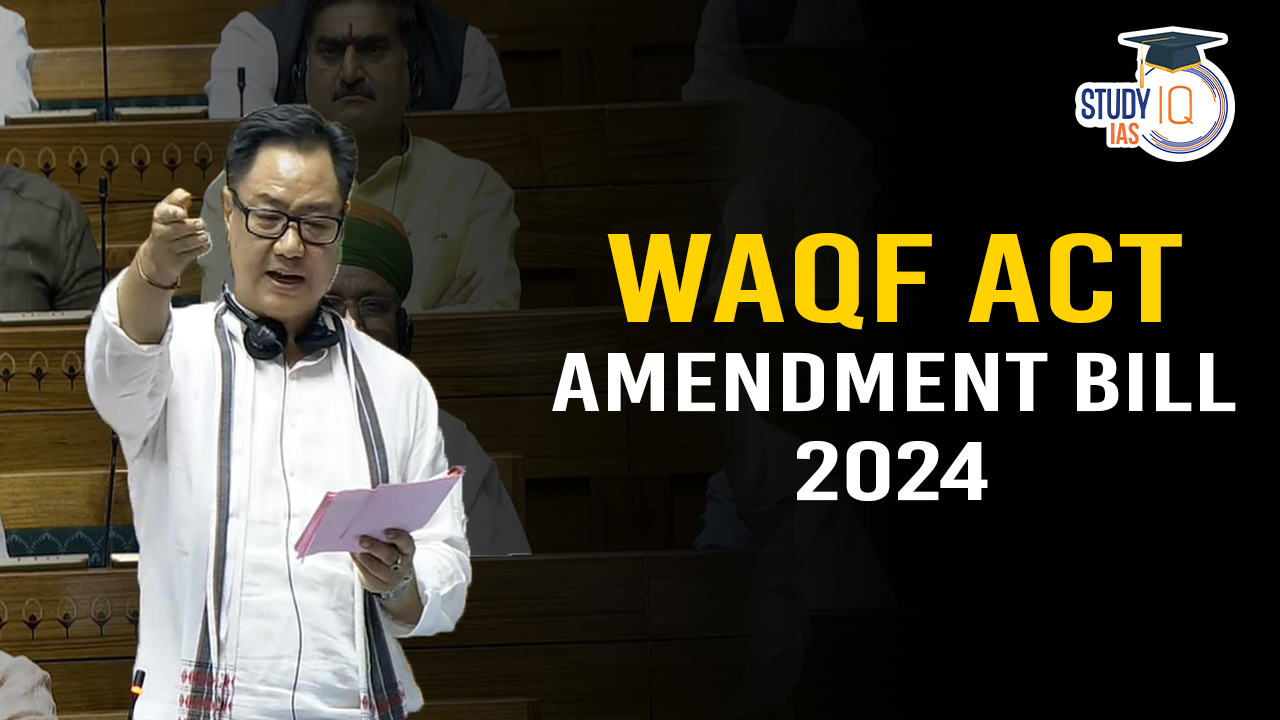Table of Contents
The Waqf Amendment Bill 2024, introduced by Union Minority Affairs Minister Kiren Rijiju, proposes significant changes to the Waqf Act of 1995. The bill has been referred to a Joint Committee of Parliament for further scrutiny. Key amendments include enhanced governance mechanisms for Waqf properties, stricter regulations for their management, and provisions aimed at increasing transparency and accountability. The proposed changes are intended to address longstanding issues related to the administration and oversight of Waqf properties, ensuring better compliance with legal standards.
Protest Against Waqf Amendment Bill in Delhi
Protests against the Waqf Amendment Bill, 2024, have erupted in Delhi, with opposition members expressing strong objections to the bill’s provisions. Demonstrators, including leaders from AAP and AIMIM, criticized the appointment of Ashwini Kumar, a non-Muslim, as the Delhi Waqf Board administrator, arguing that it undermines Muslim representation in Waqf matters. They also contested his report, which supported amendments perceived as government overreach into Waqf properties. The Joint Parliamentary Committee agreed to hear the Delhi government’s perspective amid ongoing tensions over the bill’s implications for the Muslim community
Joint Parliamentary Committee Discusses Waqf Amendment Bill, 2024
The Joint Parliamentary Committee (JPC) on the Waqf Amendment Bill, 2024, convened in New Delhi on October 15, 2024. Chaired by Lok Sabha MP Jagdambika Pal, the meeting focused on proposed amendments to the Waqf Act, 1995. The Ministry of Minority Affairs provided insights into the bill’s objectives, which aim to address inefficiencies in the management and administration of Waqf properties.
The JPC’s scrutiny is crucial, as its recommendations will shape the final form of the legislation before it is presented during the Winter Session of Parliament. The proposed amendments seek to improve transparency and oversight in the Waqf sector.
What is Shimla Mosque Dispute Case?
The Shimla Mosque Dispute involves a mosque in Sanjauli, Shimla, originally a single-story structure, which was expanded to five stories. Local Hindu groups allege this expansion was illegal, citing concerns over unauthorized construction and demographic impacts. The Waqf Board claims ownership and regulatory compliance. The Shimla Municipal Corporation disputes this, arguing the expansion encroached on government land. Protests demanding the demolition of the mosque have led to clashes with police, resulting in injuries. Prohibitory orders are in place, and increased security is being deployed. The legal case is ongoing, with the next court hearing scheduled for October 5.
Waqf Act Amendment Bill 2024 in Lok Sabha
The BJP-led government introduced the Waqf (Amendment) Bill, 2024 in the Lok Sabha on 8th Aug 2024 to modify the Waqf Act, 1995. This bill aims to “effectively address issues” concerning the powers of the State Waqf Boards, the registration and survey of waqf properties, and the removal of encroachments which is by presented by minority Affairs Minister Kiren Rijiju in Lok Sabha.
In addition to presenting the Waqf (Amendment) Bill, 2024, Rijiju will also introduce The Mussalman Wakf (Repeal) Bill, 2024, which aims to repeal the Mussalman Wakf Act, 1923. The Waqf (Amendment) Bill, 2024, proposes renaming the Waqf Act, 1995, to the Unified Waqf Management, Empowerment, Efficiency, and Development Act, 1995.
Major Changes Proposed to the Waqf Act Amendment Bill 2024
- Name Change: The Bill proposes renaming the Waqf Act, 1995, to the Unified Waqf Management, Empowerment, Efficiency and Development Act, 1995.
- New Provisions Introduced:
- Section 3A: States that no person shall create a Waqf unless they are the lawful owner of the property and competent to transfer or dedicate such property.
- Section 3C(1): Declares that government property identified or declared as Waqf property, before or after the commencement of this Act, shall not be deemed to be Waqf property.
- Section 3C(2): Empowers the government to decide if a property given as Waqf is government land. The determination is made by the Collector, who will submit a report to the State Government.
- Until the government decides the issue, Waqf cannot be in control of the disputed land.
- Central Government’s Audit Powers: The Bill allows the central government to direct the audit of any Waqf at any time by an auditor appointed by the Comptroller and Auditor-General of India, or by any designated officer.
- Redefinition of Waqf Property Possession:
- Removal of “Waqf by Use”: The Bill seeks to eliminate the concept of “Waqf by use,” which under the 1995 law, allowed properties continuously and uninterruptedly used by Muslims for religious purposes to be deemed Waqf properties. This change makes a Waqf property suspect without a valid Waqfnama.
- Changes to Waqf Boards Composition: The Bill proposes changes to the composition of Waqf Boards in states, including:
- Allowing a non-Muslim CEO.
- Giving the state government the power to appoint at least two non-Muslim members to the state Waqf Boards.
Key Amendments in Waqf Bill 2024
- Property Declaration: The Bill removes the Waqf Board’s authority to declare a property as Waqf.
- It introduces the District Collector as the arbiter to determine whether a property is Waqf or government land.
- Gender Diversity: Sections 9 and 14 of the Waqf Act, 1995 will be amended.
- These amendments will modify the composition and functioning of the Waqf Board.
- The Bill proposes the inclusion of two Muslim women and two non-Muslim members on the Waqf Board.
- Section Omitted: The Bill omits Section 40, which previously granted the Waqf Board the authority to decide if a property is Waqf.
- Waqf Deed Requirements: The Bill requires the execution of a Waqf deed for the creation of Waqf.
- It ensures that the creation of Waqf does not affect the inheritance rights of heirs.
- New Name: The Bill renames the Act to “Unified Waqf Management, Empowerment, Efficiency and Development Act, 1995.”
- Limited Power: The requirement of having a Muslim CEO in Waqf Boards has been removed.
- The amendments address concerns about the Waqf Boards’ unchecked powers, which have led to extensive land being claimed as Waqf, causing disputes and misuse claims.
- Example: In September 2022, the Tamil Nadu Waqf Board claimed the entire Thiruchendurai village, predominantly Hindu.

What is Waqf?
“Waqf” is an Arabic term meaning an endowment made by a Muslim for religious, charitable, or pious purposes. The property, once dedicated as Waqf, is considered inalienable, and its benefits are used for the intended religious or charitable purposes. The administrator of a Waqf is known as a Mutawalli.
Historical Background of Waqf Act in India
- Pre-Independence: Various laws governed Waqf properties, with significant Acts including the UP Muslim Waqf Act, 1923, and the UP Muslim Waqf Act, 1936.
- Post-Independence:
- The Waqf Act, of 1954, was the first comprehensive legislation enacted by the Indian Parliament to manage Waqf properties.
- The Waqf Act, of 1995, replaced the 1954 Act, aiming to bring uniformity in the administration of Waqf properties across the country.
- 2013 Amendments: Significant amendments were made to the Waqf Act in 2013, providing more powers to Waqf Boards and introducing measures for better governance.
Concept of Waqf
- Nature of Waqf: A Waqf refers to property dedicated in the name of God for religious and charitable purposes.
- Legally, it is the permanent dedication by a Muslim of any movable or immovable property for purposes recognized by Muslim law as pious, religious, or charitable.
- Establishment of Waqf:
- A Waqf can be established through a deed or instrument.
- A property can also be considered a Waqf if it has been used for religious or charitable purposes over a long period.
- Utilisation of Proceeds: Proceeds from a Waqf typically fund educational institutions, graveyards, mosques, and shelter homes.
- Non-Transferable Nature: Once designated as a Waqf, the property becomes non-transferable and is detained perpetually as a charitable act toward God, effectively transferring ownership to God.
- Types of Waqfs:
- Public Waqfs serve charitable ends.
- Private Waqfs benefit the property owner’s direct descendants.
- Creation Requirements: To create a Waqf, the individual must be of sound mind and hold valid ownership of the property.
- Waqif Eligibility: The creator of a Waqf, known as the Waqif, does not have to be a Muslim, as long as they profess belief in Islamic principles.
- Regulation of Waqfs in India:
- Governing Law: Waqfs in India are regulated by the Waqf Act, 1995.
- Management: Waqfs are managed by a mutawali, who acts as a supervisor.
- Comparison with Trusts: Unlike trusts established under the Indian Trusts Act, 1882, which can serve broader purposes and be dissolved by the board, Waqfs are specifically for religious and charitable uses and are intended to be perpetual.
Key Provisions of the Waqf Act 1995
- The Waqf Act was first passed by Parliament in 1954.
- It was later repealed, and a new Waqf Act was passed in 1995, granting more powers to Waqf Boards.
- In 2013, the Act was further amended to grant the Waqf Board extensive powers to designate property as ‘Waqf Property.’
- The Act provides a framework for the establishment and functioning of Waqf Boards at both central and state levels, responsible for managing and overseeing these properties.
Role of Waqf Board
- A Waqf Board is a legal entity capable of acquiring, holding, and transferring property.
- State-Level Composition:
- Each state has a Waqf Board led by a chairperson.
- The board includes nominees from the state government, Muslim legislators, parliamentarians, members of the state Bar Council, Islamic scholars, and mutawalis (managers) of Waqfs with an annual income of Rs 1 lakh and above.
- Responsibilities:
- Administers Waqf properties.
- Recovers lost properties.
- Sanctions the transfer of immovable Waqf properties through sale, gift, mortgage, exchange, or lease, with at least two-thirds of the board members voting in favour of the transaction.
- Custodianship: The board appoints custodians to ensure that the Waqf and its revenue are used for their designated purposes.
- Central Waqf Council (CWC): Established in 1964, the CWC oversees and advises state-level Waqf Boards across India.
Political and Social Implications of Waqf Act
The proposed amendments have sparked significant debate and controversy:
- Support for Reforms: Proponents argue that the amendments will enhance transparency, accountability, and proper management of Waqf properties, preventing misuse and irregularities.
- Opposition from Muslim Organizations: Several Muslim organizations and political parties oppose the amendments, viewing them as an infringement on the autonomy of Waqf Boards and an attempt to control Muslim religious and charitable affairs.
- Broader Political Context: The amendments are seen in the broader context of the government’s efforts to reform laws related to Muslim personal law, with parallels drawn to previous initiatives like the Triple Talaq Bill.
Waqf Act UPSC
The Waqf Act and its proposed amendments represent a significant aspect of India’s legal and socio-political landscape. For UPSC aspirants, understanding the historical context, key provisions, and the current debates surrounding the Waqf Act is crucial. It not only provides insights into the administration of religious endowments but also highlights the complex interplay between law, religion, and politics in India.


 Indian Diaspora: History and Legacy of G...
Indian Diaspora: History and Legacy of G...
 What led to the Azerbaijan Airlines Jet ...
What led to the Azerbaijan Airlines Jet ...
 Accessibility Rules Based on Principles
Accessibility Rules Based on Principles




















